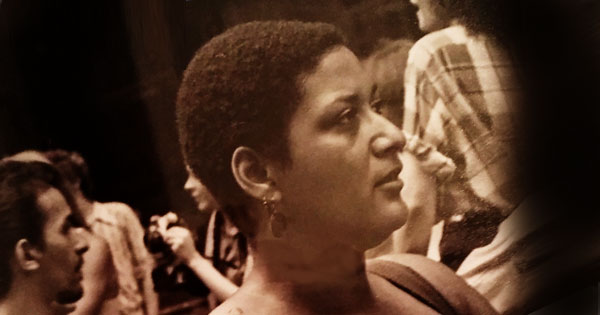By Jewelle Gomez
At a conference recently I had tea with a young, African American theatre artist and it was a great joy to connect with a woman from a younger generation who’d found her métier, certainly much earlier than I did. But she said, somewhat hesitantly but very convinced she was right that some people of her generation felt that Baby Boomers had dropped the ball. We’d demonstrated and raised issues but had left them unfinished.
Needless to say I nearly choked on my tea! I then took a deep breath and tried to frame my response so it didn’t sound furious or condescending. Apparently these is some sentiment among the younger generations (I can’t quite keep up with what each of them is called after Millenials) that we Baby Boomers had left them holding the bag—they were stuck with everything from college debt to #45 in the White House.

A kaleidoscope of images rolled through my mind: the early Saturday mornings (not my best time) in college that I opened up Afro House so we could put out the Black Student Newspaper. The thousands of flyers handed out demanding that our school and then our employers divest from companies doing business with South Africa as long as apartheid was in place and Nelson Mandela was in prison. Then there was that anti-nuke demo in Manhattan that was so big nobody could move. Fortunately, I was there with a bunch of lesbian poets and we could read to each other. The repeated demonstrations for accessibility—which is why we now have cut sidewalks for wheel chairs and buses that bend down.
I didn’t want to deluge her with the list of things that she and her generation take for granted as their right—suing if a landlord won’t rent an apartment to her and her girlfriend or being able to reasonably expect the police to respond if you’re physically or sexually assaulted by a man or being able to terminate a pregnancy without putting your life in danger.
Instead of listing the ways the world had changed since I was her age (of course not all of them are positive…oil spills and rapacious real estate interests have grown) I tried to put activism in a different perspective. It’s one I’ve come to that helps me understand the nature of social activism. Like her when I was young, I believed we’d fix things within our lifetimes and then we’d be living in some wondrous state.
As time passes, I understand that social change isn’t a onetime thing. The world is not static so a group of people can’t demonstrate, legislate or adjudicate one issue and expect that all will be well forever. Social change is passed down from generation to generation. If we want the world to really have progressive change we all must be ever vigilant. Baby Boomers sounded the alarm so we can all roll out and face down oppression. But maintaining remains the job of each generation whatever it’s called. And to blame one group for not completing the task is to mistakenly assume that the task is ever finished.
I feel no need to justify the work I and my generation have done as social activists. And continue to do: how did she think Obamacare got passed!? As a lesbian feminist at aged 70 I’ve been at or near the front lines since I was 16 years old; and I haven’t stopped since then.
But I am alarmed that a generation of folks has such a spotty understanding of social change. Not only do old issues need to be repeatedly confronted—look at who wants to roll back a woman’s right to choose in the 21st century or to legitimize the KKK or deprive people of their voting rights. Newly recognized issues like privacy, dismantling unions, abuse of the Second Amendment, dumping toxic waste emerge which we have to address now too. The activism mantle must always be passed on to each generation to keep up with the assault on our planet and our rights.
While I did have future generations in mind when I rose at dawn to demonstrate or print pamphlets, I never saw my efforts at changing the world as simply a gift; they were more of an instruction booklet. As Audre Lorde said: “Revolution is not a one time event.â€


